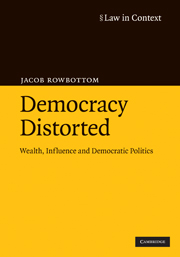Book contents
- Frontmatter
- Contents
- Preface and acknowledgements
- 1 Political equality, wealth and democracy
- 2 Freedom to speak and freedom to spend
- 3 Strategies and reforms
- 4 Access, influence and lobbying
- 5 Beyond equal votes: election campaigns and political parties
- 6 Public spaces, property and participation
- 7 The mass media: democratic dreams and private propagandists
- 8 Participation in the digital era: a new distribution?
- 9 Conclusion
- Index
- References
5 - Beyond equal votes: election campaigns and political parties
Published online by Cambridge University Press: 05 June 2012
- Frontmatter
- Contents
- Preface and acknowledgements
- 1 Political equality, wealth and democracy
- 2 Freedom to speak and freedom to spend
- 3 Strategies and reforms
- 4 Access, influence and lobbying
- 5 Beyond equal votes: election campaigns and political parties
- 6 Public spaces, property and participation
- 7 The mass media: democratic dreams and private propagandists
- 8 Participation in the digital era: a new distribution?
- 9 Conclusion
- Index
- References
Summary
Recent years have seen a succession of scandals and controversies surrounding the funding of political parties and election campaigns. The high-profile controversies have tended to focus on wealthy individuals providing funds to political parties, as in the ‘loans for peerages’ affair in which a number of individuals nominated for a place in the House of Lords had been found to have donated and loaned money to the Labour Party. As with lobbying, the concern is often that payments to politicians and parties influence decision-makers or secure favours from the politicians. This chapter will argue that party funding raises broader issues about the potential use of wealth to influence the choices voters make at the ballot box. The influence of wealth arises not only in the attempt to secure privileged access or favourable treatment from politicians, but in the use of economic resources to persuade others. The issue is not just one of corruption, but also concerns the equal opportunity to influence an election and participate in political parties.
Party funding and election spending provide a context where controls on the influence of wealth are most likely to be called for, devised and implemented. The central targets for regulation, namely candidates and political parties, are defined and provide a focus for the controls. Such controls apply to specific activities in a limited period of time, an election campaign, rather than regulate the influence of wealth in general.
- Type
- Chapter
- Information
- Democracy DistortedWealth, Influence and Democratic Politics, pp. 112 - 142Publisher: Cambridge University PressPrint publication year: 2010

